| |
Friday, August 24, 2007, 3:05 AM GeneralPosted by matthew 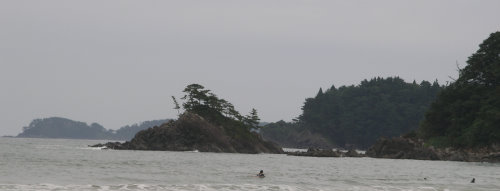 On Saturday, we met up with some friends to caravan down to the Pacific coast in Miyagi Prefecture, heading for the beach where all the Kitakami surfers go to catch waves. The mountains march right out to sea here, separating the beaches with rocky ledges and shelves. We're windsurfers, but we'd never done real surfing before, so some lessons were in order. We lacked skills but not confidence as we strode out into the water with our instructor and his assistant. 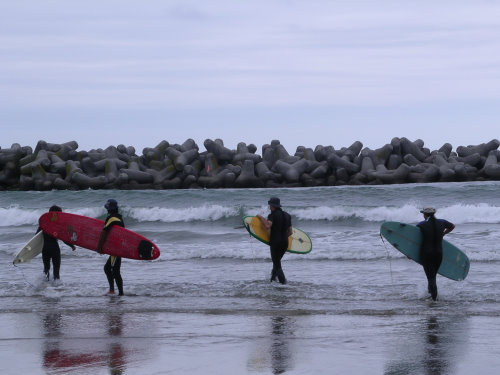 After they wore us out with paddling, they decided to give us a taste of what it's like to catch a wave. Standing up was still impossible for us, but you don't need to stand up to go fast! 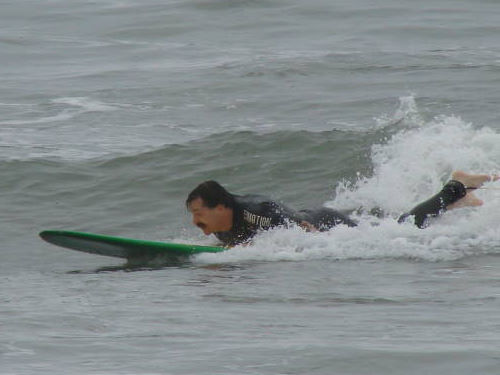 Is it fun? Maybe you can see the big grin on Stefanie's face after a good ride. 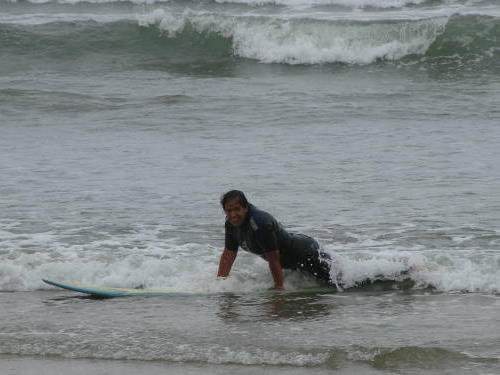 After a couple of hours we were tired, hungry, and sore. Some yakisoba and onigiri took care of the hunger, but we were still tired and sore for the trip home. At some points, the road provided an overview of the rows upon rows of mountains looming between us and a much-needed rest. 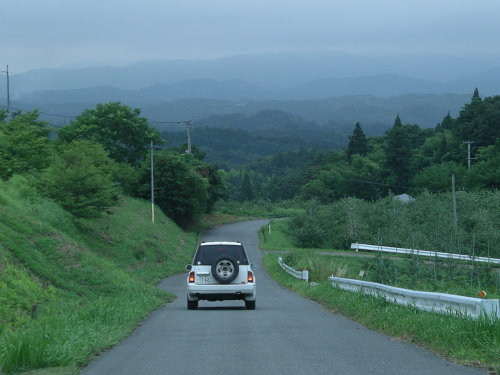 Regardless, Stefanie persevered and got us home safely.
Conquering Your Fears (Well, Mine Anyway)
Thursday, August 23, 2007, 12:27 AM GeneralPosted by stefanie Between the Great Tokyo Junket of '07 and last week's series of road trips, it seems our journeys have settled into a predictable rhythm. We hit the road, full of excitement about The Road Ahead. At some point, Matthew will comment (more or less urgently, depending on the situation) that I am way too close to the line/post/ditch/guardrail on the left for his liking. (Didn't Beyonce just have a song out about this? "To the left, to the left/Try to keep the car out the ditch to the left.") I will remind him that he can, at any time, study for and take the test to get his J-driver's license. The trip will continue smoothly until we come to an inevitable feature of The Road Ahead: an especially narrow stretch of road, usually bordered by a straight-sided ditch just about the exact width of a car tire. Then I momentarily freak out, convinced that I'll either plow into an oncoming car or drive us into the ditch. We eventually reach our destination safely, and I think "Hey, that was kind of cool. Don't be such a ninny." and feel pretty hardcore for being able to drive on Japanese roads. And then I remember that we have to get home.
Let's talk about Japanese roads, shall we? Japan is a country built on islands mostly, if not entirely, formed by volcanoes, resulting in high, pointy mountains with sheer, steep drops. It's an amazingly beautiful country, to be sure, but its geography and land usage necessitate things like high bridges, 800-meter-long tunnels, and narrow mountain roads with hairpin turns and the occasional 8% grade. And when the roads a) are a normal width; b) lack a tire-wide ditch off to the left; and c) have at least a six-inch shoulder, they're wicked fun to drive and make me wish we had the Swedewagon. When they're bordered by ditches and only about two cars wide, however, they're kind of nerve-wracking to drive.
If you read Matthew's previous post, you've read about the bear road. There were neither bears nor other traffic on it, so it was a piece of cake to navigate. Our caravan to Miyagi-ken, however, took us up steep, narrow roads running between rice paddies requiring you to negotiate with the oncoming driver who was crossing first, then back down steep, narrow roads requiring you to negotiate back-to-back-to-back hairpin curves. Coming back was even better because paddling practice during our surf lesson had rendered my shoulders nearly immobile. (Incidentally, we will blog about our surf lesson, because surfing is awesome. Even if you haven't gotten to the point of standing up.)
Prior to last week, a trip to the beach for us meant the Beltway to Route 50 and over the Bay Bridge. In Northern Japan, the mountains end at the beach, so it's twisty roads and rice paddies all the way. Faced with the choice of not driving versus not surfing -- well, there's not really a choice, is there? Ganbarimasu!
[ 3 comments ] permalink
I traveled to Morioka on Thursday to get permission to work on my current visa, which I couldn't otherwise do (it's the dreaded "dependent visa"). I *heart* the Morioka immigration office -- the staff was cordial, informative, and had me out the door with my permit in about 20 minutes, if that. So I took the rest of the afternoon to poke around a bit, beginning with lunch at the 'Bucks. Hey, I had to investigate the possibility of cupcakes (denied!). If the one especially posh street I traversed is representative of the city, Morioka is all about food, art, spas/salons, and fashion. I am a fan. Had I worn a hat, I might have tossed it in the air, I liked Morioka so much. As it was, I refrained from tossing the Weitzmans in the air for fear that their 3" heels would've taken someone's eye out had I failed to catch them. 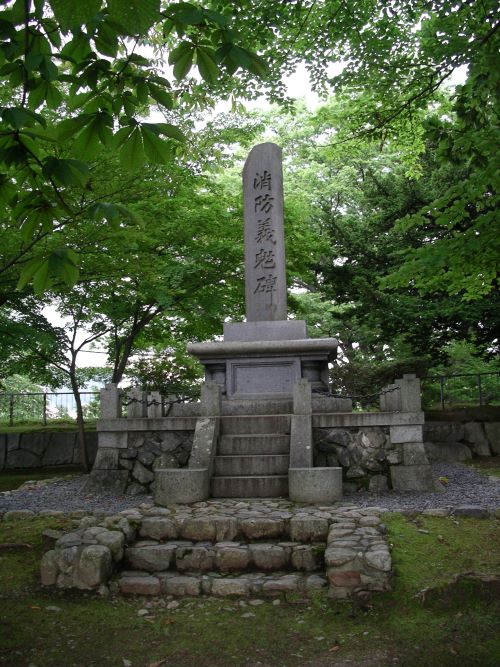 This monument is located in Iwate Park, in the middle of Morioka. Iwate Park is built on the ruins of the former Morioka Castle; its height allows for beautiful views of the city against its mountain backdrop.
[ 5 comments ] permalink
The S & M International Matsuri-Fiesta-Party-Thing
Wednesday, August 8, 2007, 12:54 AM General, FoodPosted by stefanie In the spirit of festivity surrounding matsuri, we invited a couple of friends over for dinner prior to last night's fireworks viewing. I was having some menu-development issues until Sunday, when our neighbor from across the street came over and passed me some garden-fresh tomatoes through the kitchen window. In possession of this bounty, I did what any right-thinking half-Mexican girl would do. I made salsa. And built a menu around it. Menu of chips and salsa, carnitas tacos with avocado (Sidebar: The Japanese word for "avocado" is abogado. I find this tremendously amusing.) and rice decided, we braced ourselves for the reality of our chip-and-tortilla situation. Chips and tortillas are available here, provided you're willing to accept chips and tortillas manufactured in Belgium as a viable option. Which we were, and were pleasantly surprised to discover that they didn't suck. What we were not willing to do was pay 1150 yen, or approximately $10 USD, for a six-pack of Corona. As it turned out, beer was not an issue. One of our friends brought "appropriate food and drink," as she described them when she accepted the invitation. These included edamame, Japanese vegetable chips, grilled corn, and giant cans of Kirin Ichiban beer. Back at the house post-fireworks, another friend introduced us to a snack of cream cheese cubes dipped in wasabi-enriched soy sauce, which was really quite good. Mexican food and Japanese food: two great tastes that go great together!
Friday, August 3, 2007, 10:20 PM GeneralPosted by stefanie Westerners traveling to Japan, especially the more rural areas, usually hear about the "Gaijin Stare" before they arrive. The Gaijin Stare occurs when a native Japanese, well, stares at you because of your foreignness. This phenomenon is likely not unique to Japan.
At just over two months in residence, I've grown accustomed to curious looks or questions about where I'm from. Many times, my Amerika-jin-ness doesn't come up at all. Matthew gets more attention than I do because of his height and The Moustache. The Moustache attracts wonder, awe, and on unfortunate occasions, laughter. A couple of weeks ago, it got laughed at by two separate groups in the same afternoon. The Moustache felt sad, turning its pointy tips down (or maybe that was the effing heat and humidity). Matthew confessed that this had happened previously and that it gets old.
Today, I got the full Gaijin Stare treatment, and it was kind of unnerving. I was putting my bags into the car after leaving the grocery, when I looked up to see the woman in the car across from mine staring at me. And I mean STARING. Open the car door -- staring. Close the door and move to the driver's door -- staring. Get in the car -- staring. Buckle seat belt -- staring. I did look up from what I was doing at one point to see her looking off in a different direction, but when I looked up to leave the parking lot -- staring. Even when I looked directly at her, she kept staring unblinkingly.
I don't know why today was different. Maybe others have stared and I just haven't noticed. I had my hair up, so it's not like I was rocking the curls, which might be stareworthy (Sidebar: Living in Kitakami has been FANTASTIC for my hair -- it's all bouncy and curly! Now I just need to hope for a decent stylist when the time comes.). Maybe it was because, in heels, I was standing about 5'9", or considerably taller than your average Japanese woman. Or maybe she actually was staring at my handbag, making it the Accessory Stare, known to women worldwide.
[ 1 comment ] permalink
Saturday, July 28, 2007, 8:53 PM GeneralPosted by stefanie This is one of the questions Matthew and I, and probably every other gaijin here, frequently get asked. In our experience, it is never followed by "la dee dah, dee dee dah."
There are enough English schools in Kitakami that foreign teachers come and go with some regularity, so we're not unusual in that respect. But, most people are a little surprised to learn that we knew about and loved Tohoku before we moved here. They generally are pleased to learn that Matthew chose his job in part because the company's schools are located primarily in Tohoku. Tohoku is not "where it's happening" in Japan; I've seen it, and specifically Iwate Prefecture, described in various places on the internet as "backwater." We can relate to this as native New Mexicans. When you live near Washington, at most you'll get questions about whether you're in politics, but when you talk about living in New Mexico, reactions range from: "You're so lucky -- that's God's country" to "But there's nothing/nothing to do there!"
When people learn that we came here from Washington, we start getting the latter. "What do you think about Kitakami? Don't you think it's boring?" And the truth is, not really. The area is beautiful, there's a lot of ground to be covered, and we're the new kids in town -- it's all still interesting to us. I don't really understand why people here don't dine alfresco, but that's hardly a dealbreaker.
Conversation naturally turns from Matthew's employment as the reason for our move to my profession. The first time I told someone I was an American lawyer was a revelation:
Person: What do you do? Are you also a teacher?
SKD: I'm a lawyer in America, but I will probably be teaching here.
Person: Sugoi! (translation: Fantastic!)
This reaction is pretty common and rather delightful. The Japanese don't hate lawyers. The relative lack of litigiousness in their society is surely one factor; another is that lawyers are comparatively rare here. None of the Japanese I've encountered has mentioned even knowing a Japanese lawyer. I don't think the Japanese even have lawyer jokes. Which, now that I think about it, is a nice side benefit of being here.
[ 2 comments ] permalink
Tuesday, July 24, 2007, 9:02 PM GeneralPosted by stefanie It's official: Every Davis is a resident of Kitakami-shi, Iwate-ken, Japan. Yesterday, we took Moki and Aki's importation paperwork to the city office and registered them with the city. They're now rocking their Japanese dog tags, written in kanji, and feeling very pleased with themselves. Actually, they're sleeping because it's really honking hot in the house, which is what happens in the summer when you don't have central A/C. Speaking of hot, it was hot enough yesterday (and probably today) that the city employees were dressed in their "Cool Biz" work clothes. The Japanese government began promoting "Cool Biz" in the summer of 2005 as a way to lower energy consumption through reduced use of air conditioning. Basically, when the temperature gets above 28 degrees Celsius (82 degrees Fahrenheit), some offices encourage male workers who usually wear suits and ties to wear short-sleeved dress shirts with open collars. Everyone is encouraged to wear breathable, moisture-wicking fabric. Essentially, Japan is advocating environmental responsibility through government-sanctioned short-sleeving. Merchant gift update: Since our last report, we've received another box of tissues and a box of laundry detergent from the cell phone company.
[ 1 comment ] permalink
Saturday, July 21, 2007, 3:03 AM GeneralPosted by stefanie Things to soothe a soul on a gray, rainy, depressing day: an oolong highball, a friendly face, and a new dining venue.
Last weekend, while walking the dogs, Matthew and I noticed the telltale red lantern of a restaurant on the side of a building just slightly out of our normal everyday paths. Reading the menu, it appeared to be reasonable; hearing the laughter emanating from inside, it sounded like a good place to know. It also appeared to be teeny-tiny. We finally made it there tonight, and were greeted by the standard hearty shout of "Irasshaimase!" ("Welcome!") (Sidebar: this tradition can be unnerving the first few times you go into a restaurant in Japan because the first thing that crosses your mind is "Why is everyone in the joint yelling at me?"). Apparently consistent with our previous assessment, it was tiny -- only three tables, and about five seats at the bar, only one of which was unoccupied.
Seeing our disappointment, the proprietress directed us through a curtain to a traditional room in the back, meaning a room with low tables and zabutons (floor cushions for sitting). We took the table next to the kitchen serving window and set about making our dinner decisions -- katsu kare (breaded pork cutlet with curry) for Matthew, yakiniku teishoku (grilled meat set with rice, pickles, and miso soup) for me. A note on the menu directed patrons to ask "Father Hige" something after dinner. We regret to inform our readers that we did not comply with this directive.
Father Hige was the cook, who came out to chat with us personally. He and Matthew bonded over their moustaches before he took our order and disappeared. Matthew and I unwound over shochu (a distilled spirit) and the aforementioned oolong highball -- iced oolong tea mixed with shochu. Dinner itself was fast, hearty, and comforting.
As we were leaving, Matthew and Father Hige had a longish conversation in Japanese. Father Hige gave us a laminated delivery menu (yay!), complimented Matthew on his Japanese skills, and exhorted us to return. We assured him that we would, and wandered off into the night, full of good eats, good drinks, and the cheer resulting from being welcomed into someone's world.
[ 4 comments ] permalink
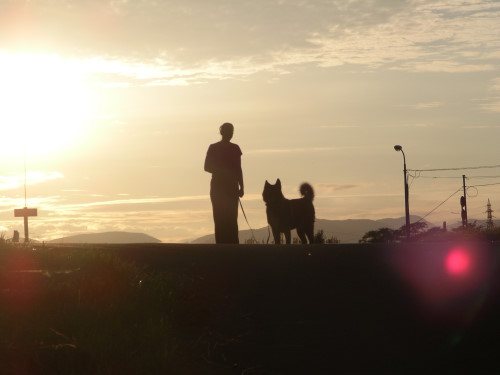 Sometimes, it's just good to be alive. Typhoon Number 4 headed out to sea last night, so instead of the heavy rain predicted all day, we got partly cloudy skies, moderate temperatures, and a cool breeze. A major earthquake rattled Niigata, but we didn't feel it here. We took an evening walk with the dogs to watch the sunset. Sometimes, it's just good to be alive.
The Things We Do for Love
Thursday, July 12, 2007, 7:32 PM GeneralPosted by stefanie 1) Begin life together. Adopt and raise very cute Akita puppy.
2) Cheer for law-school-in-Washington-applying wife, even though acceptance would mean leaving family, new home, great job, and awesome friends.
3) Move to Washington, bringing Akita dog along. Mourn loss of very cute, but congenitally ill Akita dog. Also, mourn existence of law school. Adopt wise, hard-luck Akita dog because husband loves his photo. Adopt very cute female Akita puppy because wife thinks she belongs in the house and makes other dog happy.
4) Good gravy, is there still more law school? Endure long-distance relationship while wife works in Philadelphia. Once home, frequently take snacks and cocktails down to the basement and layout-building husband.
5) Celebrate end of law school, but make dinner and do all chores during wife's bar study. Perfect repertoire of brunch dishes during series of parties to commemorate end of husband's Japanese class sessions.
6) Apparently enjoy blissful year of marriage during which nothing of note occurred. Seriously. I got nothing.
7) Buy second house together. Discover that prior owners' home improvements are completely random and nothing about house makes sense. Survive monthlong Plague House episode, trading congestion, respiratory distress, pinkeye, and insomnia.
8) Spend thirty nearly consecutive hours in car together during impulsive cross-country road trip from Washington to Cerrillos on Christmas Eve/Day. Then make return trip while both spouses are sick -- one drives, one dispenses drugs on a regular schedule.
9) Go through life-changing events together, then vacation in Japan. Discuss whether vacation was in fact recon trip.
10) Go though life-changing event together. Cheer for teaching-job-in-Japan-applying husband, even though acceptance would mean leaving family, home, great job, and awesome friends. Move to Japan and bring Akita dogs along.
Ten years behind us, a lifetime to go.
[ 6 comments ] permalink
Back Next
|
|







 Calendar
Calendar




